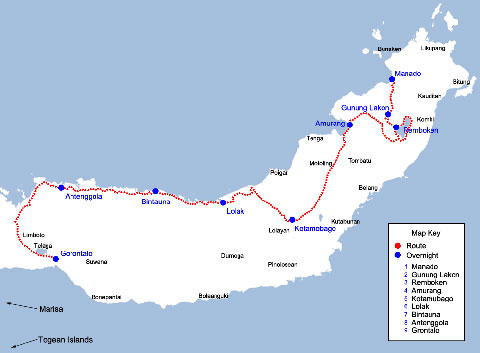Indonesia Community Stay
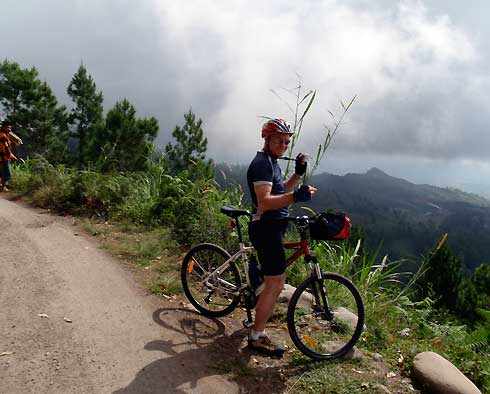
Choose where you sleep
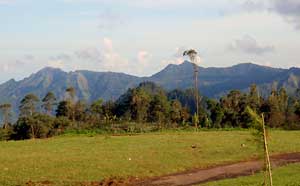 The Indonesian island of Sulawesi is ideal for adventurous cyclists: this is for riders who want the physical challenge of tropical mountains, who are looking for cultural adventure in a traditional Asian society off the beaten track, and who view the unpredictability of travel in a developing country as something to be expected and enjoyed. It is also for people who are attracted by the natural world.
The Indonesian island of Sulawesi is ideal for adventurous cyclists: this is for riders who want the physical challenge of tropical mountains, who are looking for cultural adventure in a traditional Asian society off the beaten track, and who view the unpredictability of travel in a developing country as something to be expected and enjoyed. It is also for people who are attracted by the natural world. 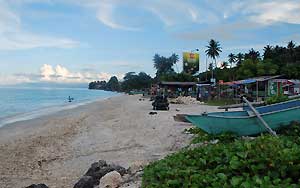 The island's extraordinary, spidery shape, formed from ridges of jungle-clad volcanoes, has allowed migration of species only in a 2-dimetional direction, resulting in extraordinary bio-diversity with more endemic plant and mammal species than almost anywhere else on the planet.
The island's extraordinary, spidery shape, formed from ridges of jungle-clad volcanoes, has allowed migration of species only in a 2-dimetional direction, resulting in extraordinary bio-diversity with more endemic plant and mammal species than almost anywhere else on the planet.
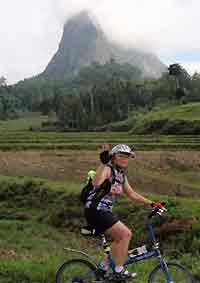 The geographic dis-uniformity in Sulawesi is matched by ethnic, linguistic and socio-cultural diversity. The major ethnic groups on the island – the Buginese, the Makassarese, the Minahasans and the Toraja for example, have their own cuisines, architecture, languages, traditions and customs. And although the Dutch had a presence in Sulawesi for several centuries it was limited mostly to Makassar and Manado. For most of the rest of the island the Dutch influence was short and superficial, religion in Toraja, Central and North Sulawesi being a notable exception.
The geographic dis-uniformity in Sulawesi is matched by ethnic, linguistic and socio-cultural diversity. The major ethnic groups on the island – the Buginese, the Makassarese, the Minahasans and the Toraja for example, have their own cuisines, architecture, languages, traditions and customs. And although the Dutch had a presence in Sulawesi for several centuries it was limited mostly to Makassar and Manado. For most of the rest of the island the Dutch influence was short and superficial, religion in Toraja, Central and North Sulawesi being a notable exception.
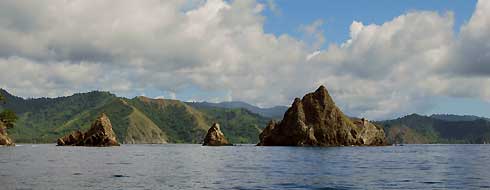
The human population in Sulawesi is sparse and very localised, which means that finding comfortable accommodation in the remote 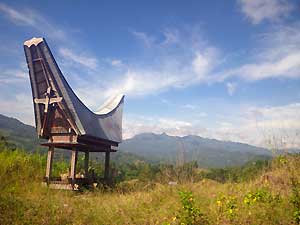 areas can be a challenge, dictating the way we plan our itineraries. When searching for good routes we look for mountains, beaches, lakes, waterfalls and points of cultural interest. We try to avoid busy crowded roads and also try to minimise time on the flat because it is there that the human population is most dense.
areas can be a challenge, dictating the way we plan our itineraries. When searching for good routes we look for mountains, beaches, lakes, waterfalls and points of cultural interest. We try to avoid busy crowded roads and also try to minimise time on the flat because it is there that the human population is most dense.
 Once we have identified suitable places to overnight, typically between 60 and 100 km apart, depending upon the terrain, we look for suitable warungs (streetside cafes). The choices are often limited because the routes are usually a long way from population centres, built up areas and miles from tourist hangouts. We eat what the locals eat, coffee and tea being exceptions.
Once we have identified suitable places to overnight, typically between 60 and 100 km apart, depending upon the terrain, we look for suitable warungs (streetside cafes). The choices are often limited because the routes are usually a long way from population centres, built up areas and miles from tourist hangouts. We eat what the locals eat, coffee and tea being exceptions.
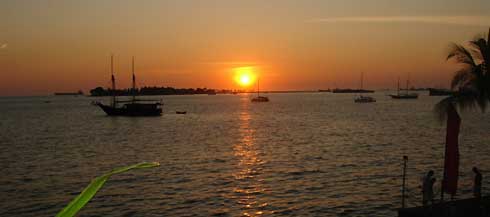
The cycle day
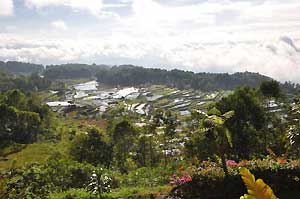 Typically we start early at around 6.30 am, and have lunch at the finish point or a couple of hours pedal from it, arriving at the destination around 3 pm, give or take an hour or two, thus allowing time for a siesta before late afternoon yoga, 5 – 5.30 pm. The reality doesn’t always turn out this way but usually only for 1 - 2 days on any one trip. Dinner is normal served at around 7 pm. After a day’s cycling, yoga and swimming, most people flake by 8.30 pm or so.
Typically we start early at around 6.30 am, and have lunch at the finish point or a couple of hours pedal from it, arriving at the destination around 3 pm, give or take an hour or two, thus allowing time for a siesta before late afternoon yoga, 5 – 5.30 pm. The reality doesn’t always turn out this way but usually only for 1 - 2 days on any one trip. Dinner is normal served at around 7 pm. After a day’s cycling, yoga and swimming, most people flake by 8.30 pm or so.
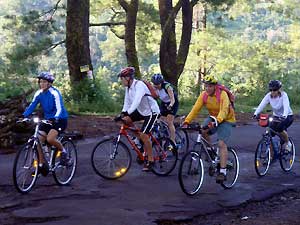 During the cycling try to keep to keep the group 'more or less' together and to promote opportunities for mixing, particularly between the speed-heads and the more relaxed riders. Each day a leader is appointed. his or her job is to monitor the overall speed of the group and to actively work at keeping it together. They’re assisted by a sweep. Everybody gets a turn at both jobs. For the maniacal speed heads there’s a special 'liaison role' which allows them to zip back 'n' forth with messages between the leader and the sweep bringing up the rear. The group rides in between one support vehicle at the front and one at the rear.
During the cycling try to keep to keep the group 'more or less' together and to promote opportunities for mixing, particularly between the speed-heads and the more relaxed riders. Each day a leader is appointed. his or her job is to monitor the overall speed of the group and to actively work at keeping it together. They’re assisted by a sweep. Everybody gets a turn at both jobs. For the maniacal speed heads there’s a special 'liaison role' which allows them to zip back 'n' forth with messages between the leader and the sweep bringing up the rear. The group rides in between one support vehicle at the front and one at the rear.
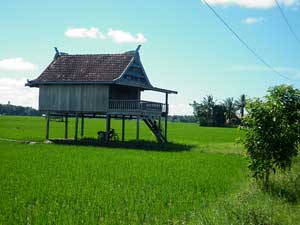 Rest stops
Rest stops
We try to stop in pondoks – apparently temporary but in fact permanent roadside bamboo and thatch shelters. These simple structures are for locals to rest in, to escape the heat or rain or just to catch up on local gossip. If we can’t find a pondok, we’ll usually opt for a warung (street-side coffee shop) or a spot where there’s a good view or lots of shade. Stops are multi-purpose. Apart from providing relief to weary sitting bones and  having a cuppa, you can stretch, enjoy the camaraderie of other riders and bonhomie with the locals who usually want to know everything about us, after all, with our shiny gear and lycra, we look like creatures from outer space. Often there’s a fun exchange of language learning.
having a cuppa, you can stretch, enjoy the camaraderie of other riders and bonhomie with the locals who usually want to know everything about us, after all, with our shiny gear and lycra, we look like creatures from outer space. Often there’s a fun exchange of language learning.
There’s always enough flexibility in the planned ride to permit spontaneous stops to explore things that might catch your attention. 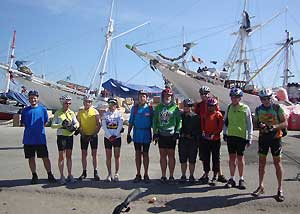 In past trips groups have dropped in on village meetings, police stations, Balinese funerary rites, Muslim circumcision ceremonies, weddings, seaweed farmers, rice farmers, martial arts classes, community health clinics and schools. Distance or time between rest stops is a function of terrain, group cycle strength, availability of suitable stop spots, need for rest, need for refreshments, the ambient scenery, etc.
In past trips groups have dropped in on village meetings, police stations, Balinese funerary rites, Muslim circumcision ceremonies, weddings, seaweed farmers, rice farmers, martial arts classes, community health clinics and schools. Distance or time between rest stops is a function of terrain, group cycle strength, availability of suitable stop spots, need for rest, need for refreshments, the ambient scenery, etc.
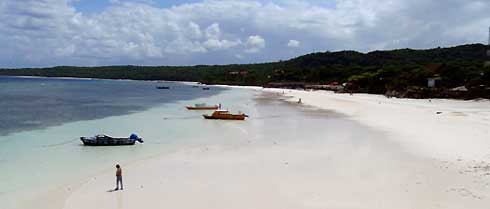
Accommodation
At the trip start and finish points, which are usually in major population centres such as Makassar, the accommodation is 'international'. Accommodation along the way is mostly in simple family run guesthouses called 'wismas'. The other guests at these wismas tend to be commercial travellers. On these routes other foreigners are rarely seen. Wismas are usually clean, have AC and sit down toilets. Many of them have hot water. Towels and soap are supplied. Security has never been a problem.
If there’s a choice we always choose the 'best available'. On the Toraja trips we spend some of the nights in traditional boat shaped houses.
Food
Nutritious food for heavy duty cycling is a must. We always stick to the local Sulawesi cuisine which means nasi goreng (fried rice) or nasi kuning (rice cooked in coconut milk) for breakfast or in those parts where tourists pass through, banana pancakes or bread. For lunch & dinner steamed rice, grilled fish or chicken and stir fried or fresh salad vegetables plus a chicken, fish or broth. It’s tasty with the chillies being served separately as a sambal made from fried garlic, onions and tomatoes. Dessert is fruit-in-season. It’s a simple, wholesome low fat, non-dairy dietary regime.
While cycling, the support crew are always on the lookout for fresh fruits and kue kampung or village cakes, which are usually made from sticky rice flour, palm sugar and coconut flesh or cream. We carry our own fresh water on the support vehicles and at the rest stops you can fill your bidons and enjoy cups of hot tea and coffee or a cool drink also from the cool box. On some days we’ll buy vegetables from morning markets for cooking further down the track.
Support vehicles
Typically there will be have one van for every 6 riders. At the start of each day riders put their heavy luggage in these vans. One of the vans carries water tanks, snacks, cycle repair gear and the cycle mechanic. At the end of the day the drivers take your bikes, wash them and the mechanic lightly services the bikes and conducts any necessary repairs.
Yoga
After we’ve reached our destination and late in the afternoon, before dinner, you can join an optional yoga class. Riders tell us that for them the stretching and relaxation in the yoga is one of the highlights of the trip. In leading the practice we assume that no one has done any yoga before.
The people
The people in Sulawesi are friendly, hospitable, respectful and very tolerant towards overseas visitors, especially cyclists. The trip will have police approval and in some places we may be police escorted through town, a real hoot. On some Sundays we’ll join with local cyclists on their regular Sunday ride. Sulawesi drivers are far more tolerant, respectful and patient towards cyclists than their counterparts in the West.
Indonesian language
In the early stages Bahasa Indonesia is easy to learn because its not tonal like some mainland Asian languages are and a few key words can take you a long way. As well Indonesians are incredibly receptive towards foreigners who have a go. Our experience is that you take one step towards them and they take 10 towards you.
During the trip at rest stops your guides will actively teach you the basic elements of the Indonesian language such as counting, basic courtesies and greetings. they will make opportunities for you to interact with the locals where ever you might find yourself so that you can practice the language that you’ve just learned.
Group size
In order to run the trip we need at least 6 riders and we prefer not to take more than 12. These small numbers help the building of supportive and harmonious relationships and make teaching / learning yoga and Indonesian language easier than with a large group.
Health and fitness
These trips are not for feint hearted, arm chair couch potatoes. They are for cycle-prepared healthy individuals who don’t mind a bit of roughing it. Anyone interested should check with their family doctor as to what inoculations are required as they vary from time to time and from country to country. And you should be prepared to commit yourself to a training program (cycling 3x a week at least in the weeks running up to the trip) that, ideally, should start 3 months prior to the trip.

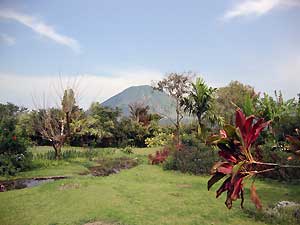 tombs. 4 km further ascent we can cool off and relax in the swimming pool at Sawangan. We’ll climb another 12 km to Lake Tondano where we’ll lunch in a rustic lakeside restaurant and then 15 km on to luxurious Gardenia Country Inn overlooking the still active Gunung Lokon volcano.
tombs. 4 km further ascent we can cool off and relax in the swimming pool at Sawangan. We’ll climb another 12 km to Lake Tondano where we’ll lunch in a rustic lakeside restaurant and then 15 km on to luxurious Gardenia Country Inn overlooking the still active Gunung Lokon volcano.